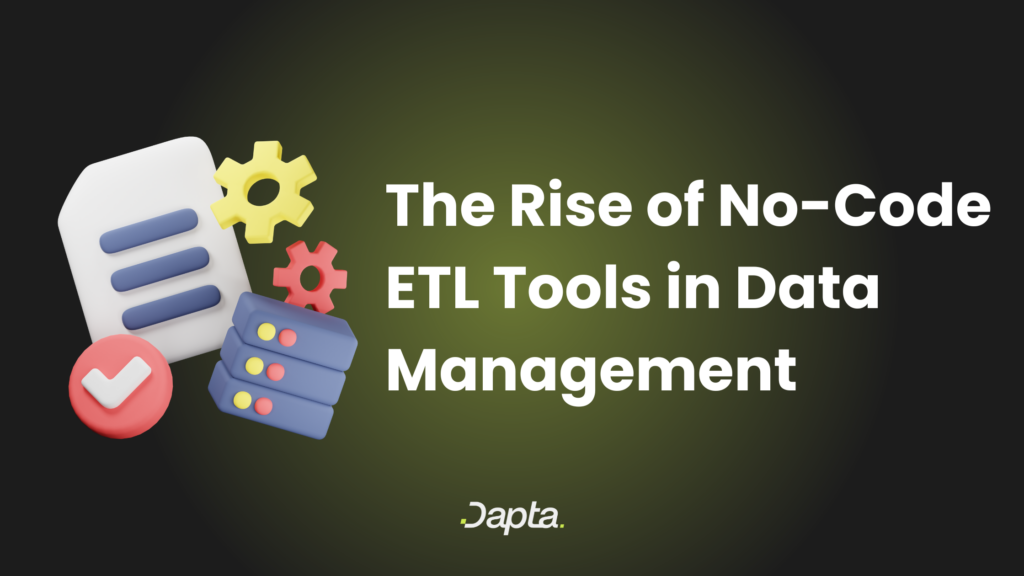The Rise of No-Code ETL Tools in Data Management

This is the era where data management becomes a breeze, thanks to the revolutionary no-code ETL (Extract, Transform, Load) tools. As businesses drown in an ocean of data, the need for efficient data processing systems has never been more critical. No-code ETL tools are the lifeboats that rescue organizations from the complexities of data integration, enabling them to navigate the vast data seas with ease and precision. In this comprehensive exploration, we delve into how these tools are not just a trend but a transformative force in the data management landscape.
The advent of no-code ETL tools signifies a paradigm shift where the technical gatekeepers of data processes are no longer the sole custodians of this crucial organizational function. These innovative tools empower users across the spectrum, from business analysts to marketing professionals, to perform data integration tasks that were once the exclusive domain of IT departments. By democratizing data management, no-code ETL tools are reshaping the way organizations approach data analytics and decision-making.
Demystifying No-Code ETL for Technical Users
For the technically inclined, the mention of ‘no-code’ may raise eyebrows. How can complex data operations be simplified without compromising on functionality and control? No-code ETL tools are designed with a deep understanding of the intricacies involved in data management. They provide a visual interface that abstracts the underlying code, allowing technical users to focus on strategy and optimization rather than routine coding tasks.
These tools come equipped with robust features such as pre-built connectors, drag-and-drop interfaces, and advanced data transformation capabilities. They enable technical users to orchestrate complex data workflows with the same precision and efficiency as traditional coding, but with a fraction of the time and effort. The result is a faster turnaround for data projects, allowing organizations to respond swiftly to market changes and opportunities.
Enhanced Collaboration and Productivity
One of the key benefits of no-code ETL tools is the facilitation of collaboration between technical and non-technical teams. By removing the barriers of specialized coding knowledge, these tools foster a more inclusive environment where insights and expertise can be shared freely. This collaborative approach leads to more comprehensive data solutions and a unified vision for data-driven strategies.
Productivity also sees a significant uptick as technical users are liberated from the tedium of writing and debugging code. They can now allocate more time to analyzing data trends, refining algorithms, and exploring innovative data solutions that drive business growth.
Scalability and Flexibility
Scalability is a cornerstone of effective data management, and no-code ETL tools excel in this regard. They are designed to handle increasing volumes of data without a corresponding increase in complexity. As businesses grow, these tools adapt seamlessly, scaling up data processes without the need for extensive reconfiguration or additional resources.
Flexibility is another hallmark of no-code ETL tools. They support a wide array of data sources and formats, enabling technical users to integrate disparate data with minimal friction. This flexibility ensures that organizations can leverage all their data assets, regardless of where they reside or how they are structured.
Real-World Applications and Impact
Across industries, no-code ETL tools are making their mark. In healthcare, they streamline the integration of patient data from various systems, enhancing the quality of care through better-informed clinical decisions. In retail, they enable the aggregation of sales data across multiple channels, providing insights into consumer behavior and optimizing inventory management.
In the realm of finance, no-code ETL tools facilitate compliance with regulatory requirements by simplifying the consolidation and reporting of financial data. They also empower marketing teams to unify customer data from diverse touchpoints, crafting personalized campaigns that resonate with their audience.
Case Studies: Efficiency in Action
Consider the case of a mid-sized e-commerce company that leveraged a no-code ETL tool to integrate their online sales data with their inventory management system. The result was a real-time view of stock levels, leading to a 20% reduction in overstock and a significant boost in customer satisfaction due to fewer stockouts.
In another instance, a marketing agency used a no-code ETL tool to amalgamate social media, website, and CRM data, enabling them to deliver a 360-degree view of customer interactions. This comprehensive insight allowed for more targeted and effective marketing campaigns, driving a 30% increase in campaign ROI.
Conclusion: Embracing the No-Code Movement
The rise of no-code ETL tools is a testament to the evolving nature of data management. These tools are not a threat to the technical community; rather, they are powerful allies that enhance the capabilities of data professionals. By embracing the no-code movement, organizations can harness the full potential of their data, drive innovation, and maintain a competitive edge in the data-driven economy.
As we look to the future, the trajectory is clear: no-code ETL tools will continue to gain traction, becoming an indispensable part of the data management toolkit. For those ready to ride the wave of this technological advancement, the possibilities are limitless.
Frequently Asked Questions (FAQ)
Q: Can no-code ETL tools handle complex data transformations?
A: Yes, modern no-code ETL tools are equipped with advanced features that enable complex data transformations, often through a user-friendly interface that simplifies the process.
Q: Are no-code ETL tools secure?
A: Security is a top priority for no-code ETL tool providers. They implement robust security measures to ensure data integrity and compliance with industry standards.
Q: How do no-code ETL tools facilitate collaboration?
A: By providing a visual interface that abstracts the coding aspect, no-code ETL tools allow technical and non-technical users to work together more effectively on data integration tasks.
